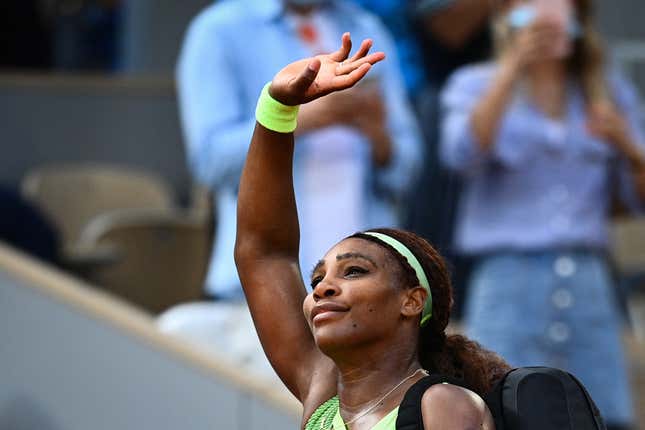
We use the term G.O.A.T. a lot when talking about superstar athletes. In case you’re unfamiliar, it stands for Greatest of All Time. Very few actually live up to this description, but one person who exemplifies this standard is Serena Williams.
After 23 Grand Slam titles—the first of which she won at age 17—Serena has announced she’s “evolving away from tennis.” The seven-time Wimbledon champion wrote about her decision in a cover story for the September issue of Vogue.
“I have never liked the word retirement. It doesn’t feel like a modern word to me. I’ve been thinking of this as a transition, but I want to be sensitive about how I use that word, which means something very specific and important to a community of people,” she wrote. “Maybe the best word to describe what I’m up to is evolution. I’m here to tell you that I’m evolving away from tennis, toward other things that are important to me. A few years ago I quietly started Serena Ventures, a venture capital firm. Soon after that, I started a family. I want to grow that family.”
She went on to confess how tough it’s been to even consider her career ending, and how she’s been unable to discuss the subject with her husband or parents.
“I’ve been reluctant to admit to myself or anyone else that I have to move on from playing tennis. Alexis, my husband, and I have hardly talked about it; it’s like a taboo topic. I can’t even have this conversation with my mom and dad. It’s like it’s not real until you say it out loud,” Williams said. “It comes up, I get an uncomfortable lump in my throat, and I start to cry. The only person I’ve really gone there with is my therapist! One thing I’m not going to do is sugarcoat this. I know that a lot of people are excited about and look forward to retiring, and I really wish I felt that way.”
Serena explains that while fellow tennis stars Ash Barty and Caroline Wozniacki seemed at peace with their decisions to retire, “there is no happiness in this topic” and she “feel[s] a great deal of pain.”
“It’s the hardest thing that I could ever imagine. I hate it. I hate that I have to be at this crossroads. I keep saying to myself, I wish it could be easy for me, but it’s not. I’m torn: I don’t want it to be over, but at the same time I’m ready for what’s next,” Serena said. “I don’t know how I’m going to be able to look at this magazine when it comes out, knowing that this is it, the end of a story that started in Compton, California, with a little Black girl who just wanted to play tennis. This sport has given me so much. I love to win. I love the battle. I love to entertain…I love the performance aspect of it—to be able to entertain people week after week. Some of the happiest times in my life were spent waiting in that hallway in Melbourne, and walking out into Rod Laver Arena with my earphones in and trying to stay focused and drown out the noise but still feeling the energy of the crowd. Night matches in Arthur Ashe Stadium at Flushing Meadows. Hitting an ace on set point.”
While she has several practical reasons for making a change now, it comes down to her desire to grow her family, something she admits she can’t do while continuing her tennis career.
“In the last year, Alexis and I have been trying to have another child, and we recently got some information from my doctor that put my mind at ease and made me feel that whenever we’re ready, we can add to our family,” the four-time Olympic gold medalist wrote. “I definitely don’t want to be pregnant again as an athlete. I need to be two feet into tennis or two feet out.”
In the coming days and weeks, there will be a lot of stories celebrating Serena’s career and influence. But perhaps her greatest impact is in the number of women of color who are now playing a predominantly white sport—and thriving in that space. Everyone from Coco Gauff, to Naomi Osaka, to Ons Jabeur cite her as their role model and inspiration.
“I’d like to think that thanks to opportunities afforded to me, women athletes feel that they can be themselves on the court. They can play with aggression and pump their fists. They can be strong yet beautiful. They can wear what they want and say what they want and kick butt and be proud of it all. I’ve made a lot of mistakes in my career. Mistakes are learning experiences, and I embrace those moments,” Williams said. “I’m far from perfect, but I’ve also taken a lot of criticism, and I’d like to think that I went through some hard times as a professional tennis player so that the next generation could have it easier. Over the years, I hope that people come to think of me as symbolizing something bigger than tennis. I admire Billie Jean because she transcended her sport. I’d like it to be: Serena is this and she’s that and she was a great tennis player and she won those slams.”

